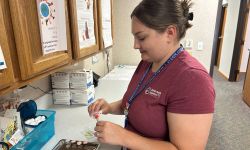More women die after heart surgery. Meet the Michigan surgeon studying why

- Dr. Catherine Wagner is a rarity in the field of heart surgery — only one in 20 heart surgeons are women
- During her young career so far, Wagner has led studies on why women are more likely to die after heart surgery
- Wagner hopes to establish herself in academia, helping the field become more equitable for women
Dr. Katie Wagner cried the first time she touched a human heart.
A first-year medical student at the University of Michigan at the time, Wagner can still see her hand sliding into the chest cavity of a patient in an Ann Arbor operating room at the urging of the surgeon in charge, and feel the heart pumping in the palm of her hand.
A decade later, the 32-year-old still can’t put into words what made the moment so emotional, but it did confirm what she wanted to do with her life.
Now an integrated thoracic surgery resident at the University of Michigan Medical Center, Wagner is a rarity in a field where just one in 20 heart surgeons are women, and even more rare as a physician who is studying why women with heart conditions are more likely to be misdiagnosed and die after heart surgeries.
And while she downplays what she’s done so far, Wagner has established herself as an advocate for other female heart surgeons, a mentor to those studying to join her in operating rooms, and a champion to women whose heart health has at times played second fiddle to the more common heart complications of men.
“I'm still a surgical trainee and learning everything in the field, but (my goal) is to have an impact on patients' lives,” Wagner said, “... to do what I can to help.”

Coffee, protein bars and scalpels
Born Catherine but preferring Katie, Wagner is the daughter of a nurse and an investment banker. She grew up in Grosse Pointe, wanting to be an ice skater.
Wagner graduated Johns Hopkins University with a bachelor’s degree. There, she wanted to study biomedical engineering, but a physics class about the cardiovascular system changed her mind.
In 2019, she graduated from U-M’s Medical School. She is now in her sixth year of an 8-year surgical residency at Michigan Medicine, specializing in the high-wire, high-stakes world of heart surgery.
“It's just this amazing, complicated thing that I guess I'm struggling with how to describe what it feels like,” Wagner said. “Each part of the heart feels a little different.”
On a typical day, her alarm goes off at 4:30 am. With a Thermos in hand, Wagner rushes the 15-minute drive to the hospital. There, she pours coffee from her thermos into a mug decorated with the image of Disney princess Anna from the movie “Frozen.” By 7:30, she’s eating a protein bar and scrubbing in for the first of what is typically two heart surgeries a day.
One day, between surgeries, Wagner was toying with a calculator that predicts the risk of dying after heart surgery. With the simple click of a button, Wagner saw the number skyrocket. She thought it was a glitch. All she had done was toggle the patient’s gender from male to female. There was no way a single factor could cause the mortality rate to jump 50%, Wagner recalled.
The stereotypical image of heart problems may be an overweight man. But women are 20% more likely to die with their first heart attack than men, according to the American Heart Association.
“Instead of viewing this as a depressing challenge … I said, ‘How can we look at this? What are the factors contributing to this disparity, and what can we do to narrow it?’”
Wagner’s first study found female patients are less likely to have additional problems fixed during surgery than men. Wagner and a small team looked at over 5,000 patients with atrial fibrillation, a condition characterized by irregular heart rhythm.
Wagner found female patients with atrial fibrillation prior to a procedure are 26% less likely to have it corrected, leaving them more susceptible to future problems, like a stroke.
In another study, Wagner reviewed almost 400 people who underwent mitral valve surgery. Women were 52% less likely to receive valve repair if they had severe leaking, she found.
“It's been a problem that really hasn't changed in decades,” Wagner said.
While these disparities are due to multiple factors, Wagner is most interested in the differences in care female patients receive. “By improving care in women we will narrow disparities in outcomes, maximize the benefit our patients receive from heart surgery and improve the quality of care for all our patients,” she said.
It isn’t just about expanding diversity within the field. For Wagner, it’s about ensuring equity for everyone affected by heart surgery. This year, the Biden administration announced the White House Initiative on Women’s Health Research.
She’s optimistic for the future of women in cardiothoracic surgery. “We’ve only just begun,” she said.
Once she walks out the hospital double doors and lets her long red hair loose from underneath her surgical cap, she heads home to see her children, 3-year-old Lucy and 18-month old Oliver, for whatever time she has before it’s time to tuck them in bed.
When she can stay awake, she fits in an episode or two of “House of the Dragon” with her husband.
Eighty-hour workweeks leave precious little time for her family, so she tries to squeeze in as much as she can, like picnics at White Lotus Farms.
It’s a difficult balance for doctors who are also young mothers, which could be one reason there are so few female surgeons.
She’s had women message her on social media, telling her they’re the first resident to be pregnant in their program. At Michigan Medicine, Wagner implemented a policy to support pregnant women in the residency training program, from ensuring them breaks between long surgeries to talking about sometimes taking them off the call schedule.
For a surgery department to adopt a policy drafted and proposed by a resident is very unusual, said Dr. Gorav Ailawadi, the director of the U-M Frankel Cardiovascular Center.
Wagner might be 1 in 20 now, but one step at a time, she hopes the field will become more inclusive. “It's a male-dominated field right now, but up and coming in the pipeline,” Wagner said.
The most difficult days aren’t the longest surgeries, but the days Wagner’s team loses a patient. On those days, she sits down with the team to evaluate whether there was anything they could have done better. Sometimes, it’s a quick run or a glass of wine that helps her de-stress, along with “trying to remember the fulfillment that (she can) get from a career like this.
“(It’s) remembering when it's really hard, remembering my love for this field and for our patients, too,” Wagner said.
“She's on her way to become a complete package as an outstanding surgeon, researcher, Ailwadi said. “She's going to have a tremendous impact on our specialty in the future.”
Years from now, Wagner hopes to continue her work in academia. She knows the field will grow and change. More than that, she’s excited for how that growth will result in better patient outcomes.
“In 25 years, the next step is going to be ensuring equity in our outcomes,” Wagner said. “It’s a really exciting time to be a heart surgeon.”
See what new members are saying about why they donated to Bridge Michigan:
- “In order for this information to be accurate and unbiased it must be underwritten by its readers, not by special interests.” - Larry S.
- “Not many other media sources report on the topics Bridge does.” - Susan B.
- “Your journalism is outstanding and rare these days.” - Mark S.
If you want to ensure the future of nonpartisan, nonprofit Michigan journalism, please become a member today. You, too, will be asked why you donated and maybe we'll feature your quote next time!








